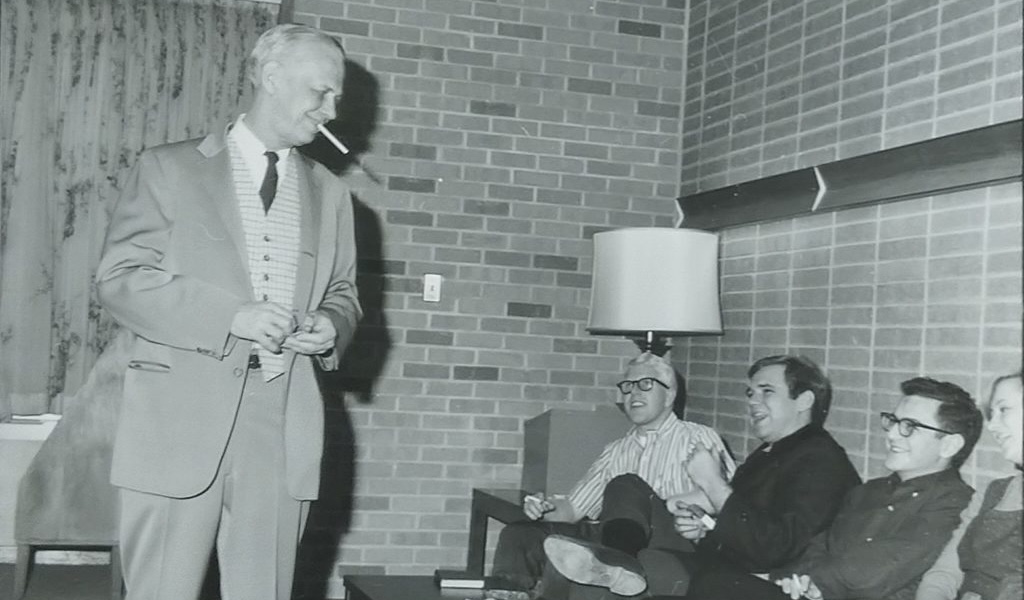In our moment, the nature and meaning of conservatism is disputed, sometimes hotly, and it’s unsurprising to observe participants turn to history for wisdom or support. Either in praise or vilification, current schools frequently mention John Courtney Murray, Russell Kirk, Frank Meyer, Irving Kristol, and William F. Buckley (obviously), among others. The appropriation of previous squabbles can make for good reading, of course, but also an occasion to understand arguments obscured in the heat of debate. For those of us born after the birth of the conservative movement, such history allows consideration of texts and figures known more by lore than acquaintance.
Willmoore Kendall (1909–1967) is a thinker of that time more often referenced than read, often an afterthought. He’s known to have been irascible, pugnacious, not able to keep friends or a job, bought out by Yale to rid themselves of a nuisance, and uncompromising in argument, thinking that he, and perhaps only he, was correct. Buckley, Kirk, Kristol, Leo Strauss, Eric Voegelin, Milton Friedman, even Ayn Rand, they are still read and viewed by many as heroes or villains, but Willmoore Kendall? He lacks disciples or an ongoing voice in the debates, although not entirely forgotten either. Consequently, the re-release of Kendall’s 1963 book, The Conservative Affirmation, including a new foreword by Daniel McCarthy, editor of the journal Modern Age, is timely for those wanting to encounter this overlooked theorist.
The Conservative Affirmation provides a snapshot of debates from the early 1960s. Kendall is a polemicist, devoting significant space, especially in the first four chapters, to summary of the apparent errors of his targets (often Kirk, Meyer, and Clinton Rossiter), and writes brilliant, succinct articulations of the principles and arguments in contention. Chapter 5 challenges the social contract theories of Hobbes, Locke, and Rousseau and any claim that the Founders embraced them. Chapters 6 and 7 attack John Stuart Mill on free speech, the idea of an open society, and versions of Christian pacifism, while the eighth and final chapter collects 30 of Kendall’s book reviews, mostly critical. To put it simply, The Conservative Affirmation is unsystematic in its approach, but the reader gains a survey of the contentions between conservative thinkers in the 1950s and ’60s in addition to Kendall’s withering views of liberalism and his central and most insistent claim: that the United States is best understood as government by “the deliberative sense of the people.”
In defining conservatism, Kendall recognizes a line demarcating left from right, and that such a line exists for a good and explanatory reason, but no one seems to agree where to place the line, what the reason is, or how it explains much of anything. He swats away religious tests, for some conservatives aren’t people of faith and some liberals believe. Nor is he satisfied with explanations given by “egg-heads” who draw the line at supposed conservative moods such as gratitude or pessimism, or at anti-statism, anticommunism, individualism, traditionalism’s resistance to change, tax policy, or any usual account. Rather, the line is a battle passing through each and every dispute of principle and policy. The battle began with liberals as the aggressors in the name of “equality,” although liberals were rebuffed and stalled time and again only to launch new offensives, often in the guise of “democratizing” the political system by turning the constitutional system into a plebiscite model—proposing to remove the Electoral College, decreasing the over-representation of rural constituents, assigning congressional seats based on popular vote, and so on. Only somewhat recently, however, has the left organized itself into a “Liberal Revolution,” where small skirmishes and “land grabs” transformed into “a wave of the future, powered by something called high principle.” Alas, conservatives continue to view themselves as offering resistance, as if they were fighting skirmishing parties trying to rob the storehouse rather than conquer the nation. As Kendall understands it, liberalism has as its purpose the establishment of “new modes and orders,” whereas conservatism is “first and foremost the resistance to that revolution” (emphases in the original).
The order Kendall has in mind is the American form of representative government. It has no space for electoral mandates, either given to a president winning the popular vote, or to Congress viewed as purely democratic, and certainly not to actions of the Supreme Court or any supposed moral and philosophical guardian of our fundamental values. The liberal revolution attempts to undo representative government, often in the name of democracy itself.
Kendall suggests there are two majorities in American politics: the first determines the Executive and the second Congress, but the nature and function of these majorities differ significantly. Presidential candidates can make outlandish policy proposals or appeal to the most abstract principles of rights, justice, or progress and persuade a majority of the people, which matters little since those proposals and treatises are not binding or even likely to become policy. Constitutional morality, on the other hand, provides quite a different sort of majority rule in Congress, where the Founders supposed the people would understand themselves to be choosing representatives who were the most virtuous of their community, sent not with instructions or mandates from the people to vote yes or no on particular policies but to deliberate on behalf of the people. Congress does not serve passions for abstract natural rights or utopian dreams of progress but governs by means of the deliberative sense of the people, as known through their representatives. The entire system of checks and balances and staggered elections and so forth is not merely to limit power and cure the effects of faction, as it so often suggested, although it is true, but also to resist popular pressures—mandates—which interfere with deliberation. Public morality, thus, is constitutional morality, not arcane wisdom or abstract rights known only to the few—not even to Lincoln, as Kendall retorts against Harry Jaffa—but to the considered judgment of the people, accomplished through the deliberation of their representatives, chosen because known by the people to be the most virtuous of their number. More than anything, the liberal revolution is a revolt against this version of public, constitutional morality in the name of a more direct vision of mandate, of democracy, in the name of equality.
In this light Kendall objects to reading the Constitution as Lockean or rooted in social contract. If social contract is understood as a kind of conventionalism, namely, that until the contract is formed there are no political standards, with the contract formed out of self-interest, then we have ignored the view of the Founders and constitutional morality, where the people consent to be governed under the constitutional morality of representative deliberation, not out of self-interest but for all those goods indicated in the preamble of the Constitution. The United States is not relativistic or committed to conventionalism, as the liberals would have it. In the same light, America is not, and ought not be, an “open society” after John Stuart Mill’s vision in On Liberty. For Mill, freedom of speech entails freedom of belief, and also of life, a refusal to countenance stability but relativism and indifference to constitutional morality itself, all of which is entirely un-American.
Kendall is less interested in the meaning of conservatism in the abstract as he is devoted to the meaning of American conservatism. His is not an appeal to old Europe, to old religion, not even to the tradition of the West, but to the American constitutional order explained, as he argues, by The Federalist Papers and ratified by the Founders of the Constitution. American conservatives defend an order of life in which the people consent to be governed through the deliberation of their representatives.
Stirring stuff, all this, and a fine corrective to those conservatives longing for philosopher kings, theocracies of various sorts, revived aristocratic norms, or supremely wise administrative states. One can only imagine Willmoore Kendall’s famous temper at the current moment.
And, yet, one does have to ask, as a serious and troubling question: Are the American people any longer devoted to such an order—is it remotely in their self-understanding? And perhaps even a more troubling question: In what way is Congress as it currently operates able, or even willing, to provide government by “the deliberative sense of the people”?

